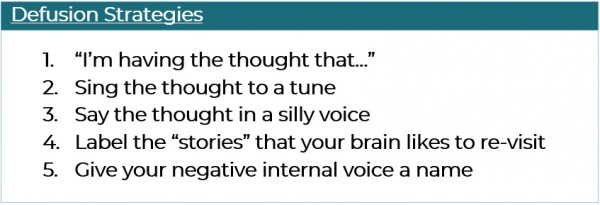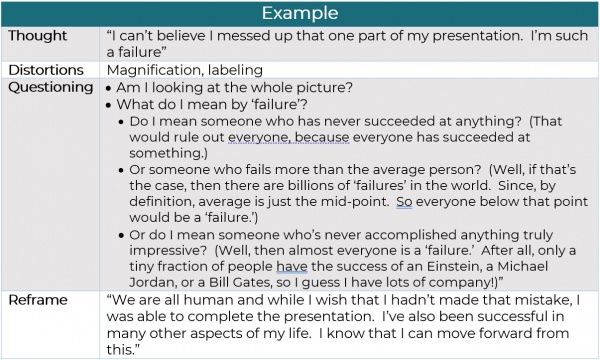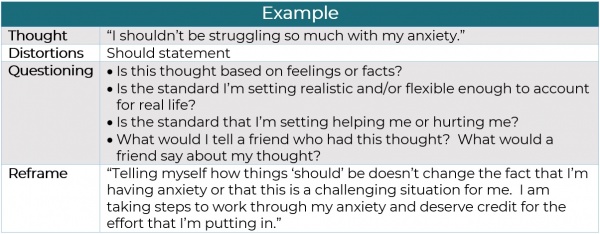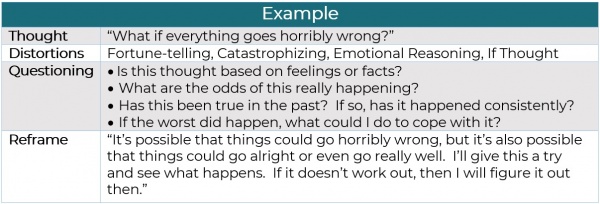If you read my last article, Unhelpful Thoughts – 12 Toxic Types to Look Out For, then you are already familiar with the kinds of thoughts can be toxic to your mental health. In this article we’ll talk about some helpful strategies for dealing with these types of thoughts.
Keep reading if you’d like to know more.
Table of Contents

Strategies for Dealing with Unhelpful Thoughts
1. Calling It Out for What It Is
Once you notice that you’re going down a mental rabbit hole of negative thoughts or really buying in to a specific negative thought, stop and take a beat. Name the thought for what it is: distorted and unhelpful.
When you’re first learning to identify your distorted thoughts, it can be helpful to write them down. You can then look back at that list of cognitive distortions and try to see what category it fits into. One thought can often have multiple distortions going on at once. It’s not critical to figure out exactly which distortion (or distortions) it is, but it can be helpful to recognize that this is the kind of thought that others may struggle with, too.
As you’re writing out your thoughts, make sure to separate out your feelings. Ask yourself, “What am I feeling?” “What thoughts am I having that are causing me to feel this way?” For example, “I’m too scared to do this,” becomes “I feel scared,” and, “I can’t do this.”

2. Acknowledging the Thought without Getting Hooked
Once you’ve identified a thought as distorted and/or unhelpful, you can choose how to respond to that thought. If your brain wants to follow that thought down a mental rabbit hole, acknowledge the urge and slam a manhole cover over that rabbit hole. Then walk away from it, figuratively speaking.
Rather than trying to argue with the thought or convince yourself of its validity (or inaccuracy), acknowledge it and move on. Re-focus on whatever is going on in the moment.
Note that there is a difference between allowing the thoughts to be there while you re-focus on the moment versus trying to deliberately engage in a task to distract yourself from your thoughts. Make sure that whatever activity you are engaged in is motivated by how you would like to be living your life, rather than simply a time filler to try and push away the thoughts.
For example, let’s say you’re having a conversation with someone, and you start Mind Reading. You think to yourself, “Oh no, I just said the wrong word. This guy probably thinks I’m an idiot now.” Acknowledge that you’re Mind Reading and re-focus on the conversation. The guy may or may not think you’re an idiot, but getting caught up in your thoughts isn’t going to help you in this situation.

3. Separate Yourself from the Thoughts
One key thing to remember is that you are not your thoughts. We all have weird, disturbing, bizarre, unhealthy, unhelpful thoughts sometimes. This does not make you weird or bizarre or unworthy in any way.
Your brain might have certain types of distortions that are its “favorites.” Or your brain might have certain themes or “stories” that it comes back to over and over again.
It can be helpful to separate yourself from these thoughts by taking a step back—a strategy called defusion. You can help yourself “defuse” from your thoughts by thinking something like, “I’m having the thought that I’m no good” or thinking the thought in a funny voice or putting it to a tune.
The point being that this can allow you to observe the thought and see it for what it is (a series of words that your brain came up with), rather than what it feels like (a dangerous or horrible fact).
You can also name the themes or “stories” that your brain likes (such as, “The Story Where I Suck” or “The Story Where No One Likes Me”) or give that negative voice in your head a name (There goes Veronica again! or That dang Snape is at it again!). This can help to both give yourself some space from the thoughts, bring some humor to the situation, and allow yourself to identify the thoughts as just that—thoughts. Not an emergency, not a fact, and not something you need to respond to.

4. Reframing or “Untwisting” Your Thoughts
When your thoughts have gotten twisted up, it can be helpful to take some time to untwist them. We call this process reframing. Reframing refers to taking an unhelpful thought and coming up with a more realistic, more helpful alternative thought.
Questions you can ask yourself to try and identify a more realistic, more helpful thought:
- Is this thought based on feelings or facts?
- What is the evidence for or against this thought? Am I taking all of the evidence into account?
- What are the odds of this really happening (or being true)?
- Has this happened or been true in the past? If so, has it been consistent?
- If the worst did happen, what could I do to cope with it?
- Am I looking at the whole picture?
- Are there positive aspects of this situation (or person, or object) that I’m ignoring?
- How can I find a middle ground in this situation?
- Are there factors in this situation that are out of my control?
- What do I mean by this label? How would I define it?
- Is this a definition that would apply to everyone? Or to no one? Or does it even apply to me?
- Is the standard I’m setting realistic and/or flexible enough to account for real life?
- Is the standard that I’m setting helping me or hurting me?
- What would I tell a friend who had this thought? What would a friend say about my thought?
Obviously, certain questions will be more helpful than others depending on the thought that you are dealing with. And certain thoughts will be more “sticky” and hard to untwist.
Here are some examples of reframing:


If you notice that trying to reframe your thoughts is simply getting you more frustrated, make sure to take a break. Focus on something completely unrelated and come back to dealing with the thoughts when you’re feeling ready.

A Note about Reframing Worry Thoughts or OCD Obsessions
Be extremely cautious when using reframing with OCD obsessions or anxiety worries. Reframing is often not a helpful strategy with these types of repetitive thoughts, as reframing is a logic-based strategy and anxiety is not based in logic. My guess is, if you could have logic-ed your way out of anxiety, you would have done it by now!
With worry thoughts or obsessions, it can be very easy to slip into reassurance (for example: “Nothing bad will happen.”) or trying to rationalize why you “shouldn’t” be worried, which can make the problem worse. In these situations, I generally recommend using the other 3 strategies discussed in this article along with other anxiety treatment techniques.
That said, here is an example of how you could reframe a worry-type thought while not falling into the traps of reassurance or rationalizing:

The Goal of Reframing Unhelpful Thoughts
When reframing unhelpful thoughts, the goal is to identify more realistic, kinder, and ultimately more helpful thoughts. Remember that everyone has cognitive distortions sometimes, and that breaking the “habit” of buying into these thoughts takes time and practice.
Practicing being kinder to yourself can be a powerful, but very challenging task. Many people struggle with showing themselves compassion and worry that if they stop mentally bullying themselves, then they will just give up altogether. Thankfully, the research shows that it is actually quite the opposite: the kinder you are to yourself, the more motivated you become to accomplish your goals.
Also look out for toxic positivity. Reframing your thoughts is not about ignoring your frustrations or disappointments or other difficult emotions. It’s important to acknowledge how you are feeling and what you might be struggling with, while also keeping things in perspective.
Choosing a Strategy
Of course, all of these strategies are easier said than done. Each of these techniques takes time and practice and some strategies may work better than others depending on the person and the situation.
For instance, if unhelpful thoughts pop up in the middle of a conversation, then it might be helpful to allow the thoughts to be there and refocus on the conversation. If you are at home by yourself and have a few minutes to work through the thoughts, however, reframing might be a more effective tool.
At the end of the day, the best strategy is always the one that works best for you.

Whatever kind of unhelpful thoughts you are dealing with, I hope that these strategies can be of some help to you!
As a reminder, this blog post is not intended as professional counseling or clinical advice. This article is meant to provide individuals with a better understanding of how to cope with unhelpful thoughts. I encourage you to consider seeking help in person if you need additional support or are feeling overwhelmed by your anxiety, OCD, or other mental health struggles.

-Kristel Roper, LMFT, LPCC
Kristel Roper is a licensed psychotherapist offering therapy services to individuals in the Sacramento area. She specializes in anxiety counseling and especially enjoys working with young adults as they navigate the challenges of college, career, and beyond. Learn more about Kristel Roper’s Therapy Services.
Photo by Louis Maniquet on Unsplash
Photo by Artem Kovalev on Unsplash
